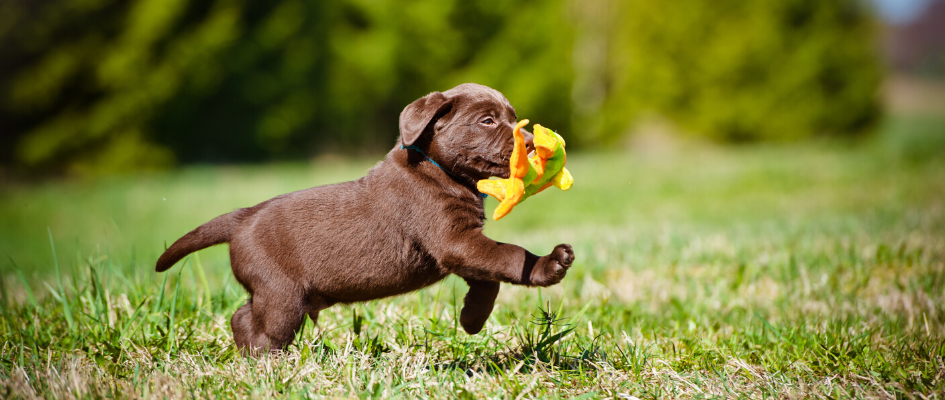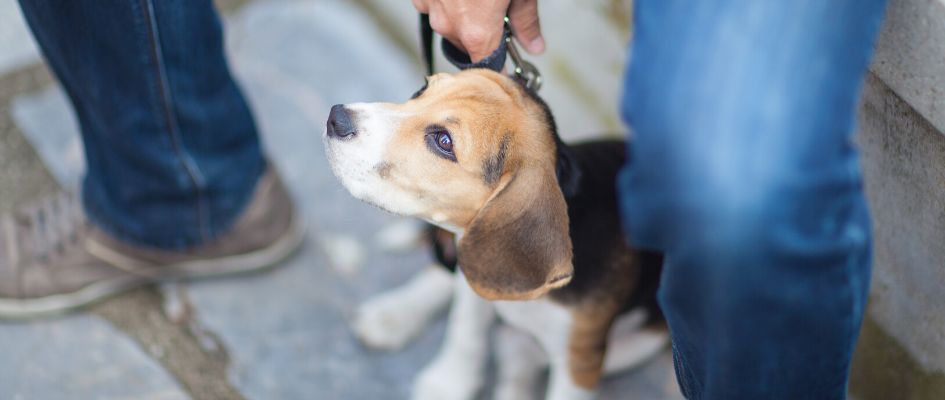Many people will have got a puppy during this past year of lockdowns which makes socialisation training a little more difficult than it would be in normal times. However, there are a number of steps you can take despite this, to ensure they have a great start to their new life with you.
Between 12 and 18 weeks of age, puppies can be very sensitive to the world around them. They may feel scared of being away from their litter and in a completely unknown new environment. At this age they need to be introduced to any new people, environments and situations in as positive a way as possible. This will help their understanding of the world as they grow up.
Dogs may otherwise grow to be fearful of the world around them. This can lead to unwanted behaviours later in life such as guarding, aggressive responses and anxiety in certain situations.
Exposure to the outside world
It is very important that you differentiate between puppies who have been vaccinated and those who have not.
- Those who have been vaccinated can walk around on the lead.
- Those who have not yet been vaccinated should always be carried in your arms, in a bag or in a pram.
Puppies need to be exposed to the world outside their homes so that they can get used to sounds, sights, smells, situations and interactions with different people and animals.
Puppies who don’t experience this exposure can become easily frightened and, in a worst case scenario, can become agoraphobic. If your puppy has been vaccinated, take them for short walks to experience traffic, meet new people and other dogs.
Always carry treats, and, when they meet something or someone new, feed them a few treats so that they make a positive association. Keep exposure time short though. Only up to 10 minutes at first to prevent them feeling overwhelmed. ‘Over-socialisation’ can actually have the opposite effect.
Gradually building up their exposure by a few extra minutes each day will help. For those unable to leave the house, sitting and watching, listening and sniffing the air from the front door (on a lead or being held), or at a window will provide your puppy with important information about the life outside the home.
Learning to be alone
You need to be very mindful of ensuring that puppies learn to cope well with being left alone after the lockdown finishes, and when life returns to normal. Providing different activities every day will help with a puppy’s sense of independence.
You could provide them with stuffed toys, chews, safe things to destroy like cardboard or paper and activity feeders. There are hundreds to buy online and there are many websites that show you how to make homemade toys (something children can join in doing). This way your puppy will learn that they can have fun on their own.
Teach your puppy to be alone by using barriers, pens or crates but be careful to only leave your puppy alone for a few seconds at first. Then increase the time slowly, otherwise they may become frightened and develop separation anxiety.
Separation can also be practised when your puppy is very sleepy. Put them into their bed, pen or crate and quietly leave the room but always listening to check that they are not showing any signs of distress.

New things
Introducing puppies to something new each day will help to build resilience when encountering something out of the ordinary and help develop natural inquisitiveness about novel sights, sounds and smells. Finding and sharing all sorts of unusual items (hats, scooters, bags, balls, suitcases, shopping trolleys, gym equipment etc) is a great way of doing this.
You can also turn everyday objects, such as chairs or tables, upside down to make them look different and put normal things in strange places. For example, put a dining room chair in the garden or bathroom. Let your puppy explore by themselves and avoid forcing them to get too close to something they are unsure about. Let them take their time and do things at their own pace.
Sounds
Many dogs become fearful of strange sounds because they have not been exposed to them as puppies. Positive exposure to many different noises can help your puppy cope at times such as, for example, during the firework season. Being stuck at home provides an excellent opportunity to work on this! The Dogs Trust provides a great variety of sound effects and free booklets on how to work with puppies to lessen their sensitivity to sounds.
You can also use real noises at home by banging doors, dropping or banging spoons against pots and pans, shouting, vacuuming and introducing animal noises on TV etc. Always try to give a reward to your puppy when exposing them to a new noise in order for them to develop a positive association with it.
Clothing
Dogs can often find people wearing strange clothing, or looking different from what they are used to, quite frightening. Help your puppy get used to the ‘different’ by introducing them to things like fake beards, glasses, big floppy coats, umbrellas, woolly hats, scarves, walking sticks, sunglasses, long skirts, helmets and hi-visibility clothing.

Travelling in the car
If you have a car then this is a good time to get your puppy used to travelling. The safest place for a dog to travel is either by being suitably restrained in the cabin with a seat belt or pet carrier, or in the boot of a hatchback with a dog guard. Give your puppy their meal in the boot/crate, sit next to them, providing treats from the back seat. Do all of this initially with the engine off. When your puppy grows comfortable with this, switch the engine on and do the same. Then go for very short trips – just around the block to begin with.
If there are two of you, one can sit in the back, dropping treats whilst the other drives. If there is only one of you give the pup a stuffed toy for the journey for comfort. Increase the frequency and length of trips very slowly, by no more than a few minutes at a time and until your puppy is completely at home with car travel.
Being handled
It is important for a puppy to learn to be handled by humans. They need to get used to being handled for veterinary examinations, bathing, towelling, grooming, nail clipping and general everyday husbandry.
Every day, for a couple of minutes, handle a different part of your puppy’s body whilst giving them treats. Keep it short and if they wriggle, let them go. Never pin them down, force them or hold them too tightly as this will make them fearful and may lead to fear aggression in the future.
Aside from stroking you could tickle them between their toes and in their pads, hold their claws gently, lift up their ears, lift up their lips and eyelids and lift up their tail.
For getting used to bathing and grooming, first gently brush and/or towel them. Put your puppy first into an empty bath and throw treats into the bath. Then turn the shower on and give them treats. You could also pick up your puppy and put them on a table and let them eat treats there too whilst gently introducing a brush or towel.
Children
Children will often see puppies as new toys and can overwhelm your new arrival. Keep playtime with children very short, for no more than a couple of minutes. Don’t let the children just carry the pup around with them and avoid all rough and tumble play.
Puppies need a lot of sleep and must be allowed somewhere quiet where they are undisturbed for naps every couple of hours at the most. Make sure that children understand this and leave your puppy alone when asleep.
Encourage children to play appropriate games such as find it or gentle fetch and also encourage them to take part in basic training.
If you need further advice or would like to book your puppy’s initial vaccination with us, find and contact your local Goddard vet today.
